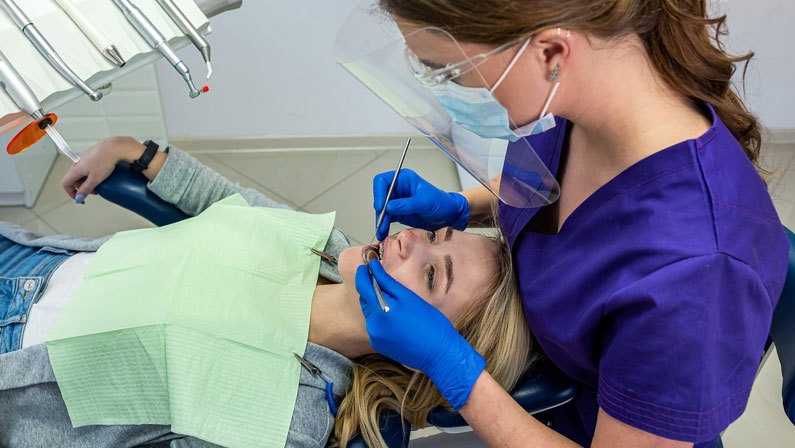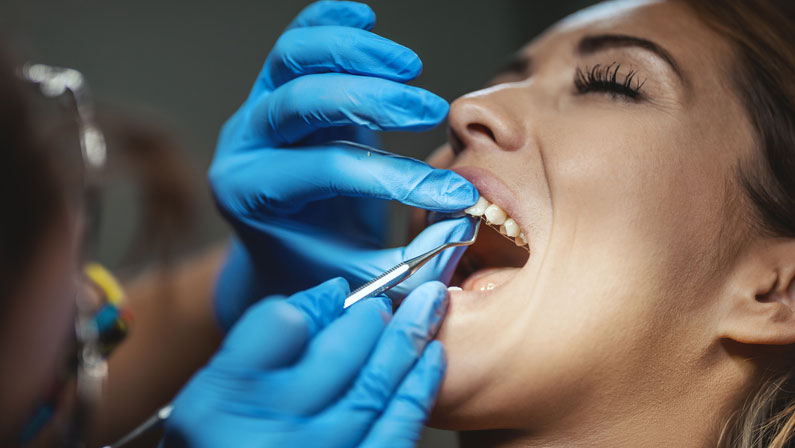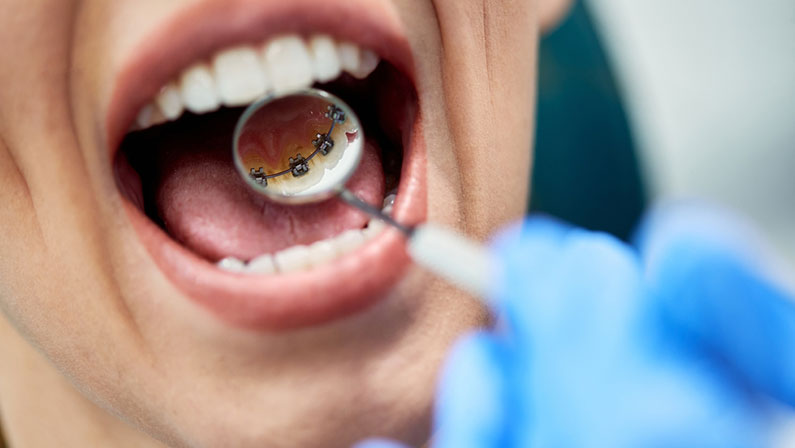Ever wondered what makes lingual braces different from traditional braces and whether they might be the right choice for you? Lingual braces or lingual dental braces offer a discreet way to achieve a perfect smile as it’s hidden behind your teeth. Let’s explore the ins and outs of this innovative orthodontic solution.
What Are Lingual Braces?
Lingual braces are a type of orthodontic appliance fixed to the backside (lingual side) of your teeth, making them invisible from the front. This placement hides the braces when you smile or talk, offering a cosmetic advantage over traditional braces.
How Do Lingual Braces Work?

Lingual braces work similarly to traditional braces. They use brackets and wires to apply gentle pressure to your teeth, gradually moving them into the desired position. The key difference is that the brackets are attached to the back of your teeth, making them less noticeable.
What Are the Types of Lingual Braces?
Several types of lingual braces cater to different orthodontic needs and preferences. Here are three popular options:
Incognito
Incognito braces are custom-made to fit the contour of your teeth perfectly. They are designed using advanced technology to ensure precise and efficient treatment.
Suresmile
Suresmile lingual braces use robotic technology to bend the archwires accurately, reducing treatment time and improving the overall effectiveness of the braces.
Alias
Alias lingual braces feature smaller brackets for added comfort and a smoother experience. They are designed to minimize irritation and improve speech performance during treatment.
Pros & Cons of Lingual Braces

Understanding the advantages and disadvantages of lingual braces can help you make an informed decision about your orthodontic treatment. Here’s a breakdown of the pros and cons of getting lingual braces:
Pros of Lingual Braces
Lingual braces offer several benefits that make them an attractive option for many patients.
Lingual Braces Are an Invisible Option
One of the main advantages of lingual braces is their invisibility. Since they are attached behind the teeth, they provide a discreet treatment option for those concerned about the aesthetics of braces.
Lingual Braces Are a More Comfortable Option
While it may take some time to adjust, many find lingual braces more comfortable in the long run because they do not protrude from the front of the teeth.
Bespoke Orthodontic Treatment Option
Lingual braces are custom-made to fit each patient’s unique dental structure, allowing for more precise and personalized treatment.
Lingual Braces Come with Smaller Brackets
The brackets used in lingual braces are often smaller than those used in traditional braces, which can make them more comfortable and less obtrusive.
Cons of Lingual Braces
Despite their benefits, lingual braces also come with some downsides that are important to consider.
Adverse Effects on Speech Performance
Lingual braces can initially affect speech, causing a temporary lisp as your tongue adjusts to the new appliances.
Having a Harder Time Keeping Your Teeth Clean
Cleaning teeth with lingual braces can be more challenging due to their placement, requiring extra diligence to maintain good oral hygiene.
Work Slower Than Conventional Metal Braces
In some cases, lingual braces may take longer to achieve the desired results compared to traditional metal braces due to their less direct application of force.
Lingual Braces vs Traditional Braces

The key difference between lingual braces and traditional braces lies in their placement. Traditional braces are the familiar kind with metal brackets and wires bonded to the front surface of your teeth. Lingual braces, on the other hand, work similarly but are positioned behind your teeth, on the tongue side. This makes them completely invisible when you smile or talk.
While both options straighten your teeth, there are trade-offs. Lingual braces offer superior discretion but may cause temporary speech impediments and require more diligent oral hygiene. Traditional braces are generally more comfortable, faster-acting, and affordable but come with the visibility factor. Consulting with an orthodontist can help you determine which option best suits your needs and preferences.
Lingual Braces vs. Invisalign Clear Aligners
Both lingual braces and Invisalign offer discreet solutions for straightening teeth, but they work in fundamentally different ways. Lingual braces function similarly to traditional braces, with customized brackets and wires bonded behind your teeth. They exert constant pressure to move teeth, requiring adjustments by your orthodontist. Invisalign utilizes a series of clear, removable aligners that you wear for a set period before switching to the next one. These aligners gently shift your teeth into alignment over time.
The key differences lie in comfort, maintenance, and suitability. Lingual braces might be slightly more uncomfortable due to their placement and require extra effort for cleaning. Invisalign, on the other hand, offers removability for easier hygiene but demands consistent wear for optimal results.
How Are Lingual Braces Installed?
The installation process for lingual braces involves several steps. First, your orthodontist will take impressions of your teeth to create custom brackets. Once the braces are ready, they will be bonded to the backside of your teeth, and the archwire will be threaded through the brackets to begin the alignment process.
Are Lingual Braces Expensive?
Lingual braces tend to be more expensive than traditional braces due to the customization and specialized installation process. On average, the lingual braces cost ranges from $8,000 to $10,000, but this can vary based on the complexity of the case and the orthodontist’s expertise.
Are Lingual Braces Right for You? Reach out to Dr. Saif Shere Today!
Lingual braces offer a unique and discreet way to straighten teeth, as it combines advanced technology with personalized treatment. Whether you’re weighing the pros and cons, comparing lingual braces vs. traditional braces, or considering the cost, understanding your options is the first step toward a confident, beautiful smile.
If you’re considering lingual braces or other orthodontic treatments, consult with a professional to make an informed decision. Reach out to celebrity cosmetic dentist Dr. Saif Shere, DMD, who specializes in cosmetic dentistry and dental braces. Located at 9824 Fondren Rd, Houston, TX 77096, Dr. Shere can provide expert guidance and personalized care to help you achieve the smile you’ve always wanted. Book an appointment today!